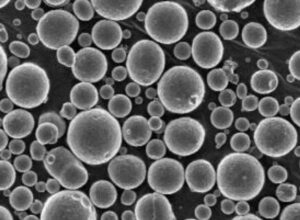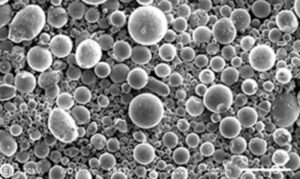について 遠心霧化プロセス は、微細な金属粉を高い精度と均一性で製造するために使用される、魅力的で複雑な技術です。あの完璧な球状の金属粉はどうやって作られるのだろう?遠心霧化の世界に深く潜り込み、その内部と外部を探り、この驚くべき技術に隠された秘密を解き明かします。
遠心霧化法の概要
遠心霧化法は、溶融金属を回転する円盤またはカップによって微細な液滴にする金属粉末製造法である。この液滴は外側に飛ばされながら凝固し、球状の金属粉末となる。このプロセスは高度に制御されているため、粒度分布や純度など、特定の特性を持つ粉末の製造が可能です。
主な内容
- テクノロジー:遠心霧化
- 主要用途:金属粉末の製造
- コア・メカニズム:回転ディスクまたはカップ
- 結果:微細な球状金属粉
- 用途:積層造形、粉末冶金、コーティングなど
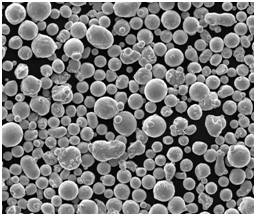
構成 遠心霧化プロセス
遠心霧化プロセスの構成を理解することは、それがどのように機能し、なぜそれほど効果的なのかを把握するために不可欠である。
| コンポーネント | 説明 |
|---|---|
| 溶融金属 | 原料は、アルミニウム、チタン、スチール、ニッケル合金などの金属が一般的。 |
| 回転装置 | 溶融金属を分散させるために高速で回転するディスクまたはカップ。 |
| 冷却媒体 | 多くの場合、金属液滴を冷却して固化させる不活性ガスまたは空気。 |
| コレクション・チェンバー | 凝固した金属粉を集めるエリア。 |
| 制御システム | 温度、速度、その他のパラメータを監視・調整するシステム。 |
使用される金属の種類
さまざまな金属や合金を遠心霧化で処理することができ、それぞれがユニークな特性と用途を持っている。
| 金属/合金 | プロパティ | 用途 |
|---|---|---|
| アルミニウム合金 | 軽量、耐腐食性 | 航空宇宙、自動車、家電 |
| チタン合金 | 高い強度対重量比、生体適合性 | 医療用インプラント、航空宇宙 |
| ステンレス鋼 | 耐食性、耐久性 | 医療機器、産業機器 |
| ニッケル合金 | 耐熱性、耐食性 | タービン、高温環境 |
| 銅合金 | 導電性、可鍛性 | 電気部品、熱交換器 |
の特性と特徴 遠心霧化プロセス
遠心霧化によって製造される粉末の特性は、様々な産業への応用にとって極めて重要です。主な特徴を説明しよう。
| プロパティ | 説明 |
|---|---|
| 粒子サイズ | 通常、数マイクロメートルから数百マイクロメートルの範囲であり、プロセスパラメーターによって異なる。 |
| 形状 | 主に球状で、流動性と充填密度を高める。 |
| 純度 | 管理された環境と最小限のコンタミネーションによる高純度。 |
| 密度 | 均一な密度は、一貫した材料特性を必要とする用途に不可欠です。 |
| 表面仕上げ | 滑らかな表面仕上げで、積層造形やコーティングの用途に有効。 |
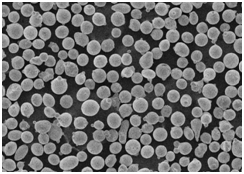
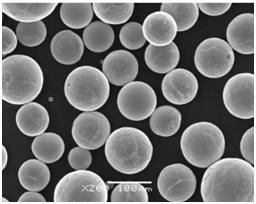
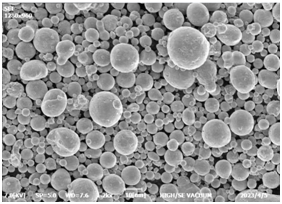

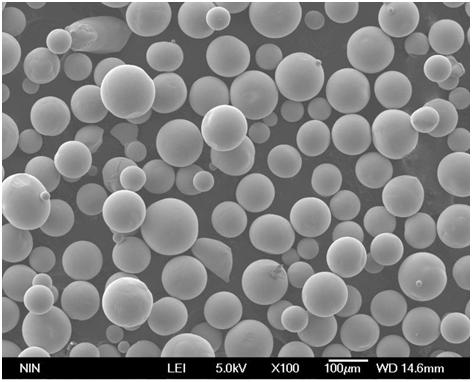
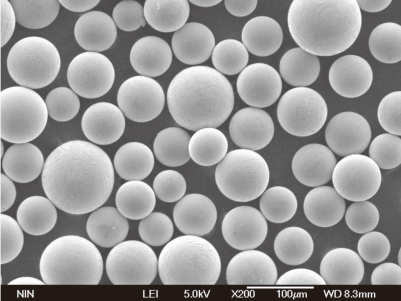
遠心霧化法の等級と規格
さまざまなグレードと規格により、製造される金属粉末は、さまざまな用途の特定のニーズを満たすことができる。
| グレード | スタンダード | 説明 |
|---|---|---|
| グレードA | ASTM B330 | 高純度で、航空宇宙および医療用途に適している。 |
| グレードB | ISO 9001 | 一般産業用途に使用される標準的な品質。 |
| グレードC | AMS 4999 | 高い強度と耐久性を持ち、自動車や構造用途によく使用される。 |
| Dグレード | MIL-STD-3021 | 過酷な条件下での信頼性を保証する軍用規格。 |
| グレードE | JIS Z8901 | 日本の工業規格で、電子機器や精密機器に広く使用されている。 |
遠心霧化法の用途
遠心霧化によって製造される金属粉末の多様性は、幅広い用途への扉を開く。
| 申し込み | 説明 |
|---|---|
| 付加製造 | 3Dプリンターで、複雑な形状を高精度に、かつ無駄なく作成するために使用される。 |
| 粉末冶金 | 複雑な形状や優れた機械的特性を持つ金属部品の成形に利用される。 |
| 溶射 | 耐摩耗性、耐食性、耐熱性を向上させるためにコーティング表面に使用される。 |
| MIM(金属射出成形) | 高密度で強度の高い、小さくて複雑な部品の製造が可能。 |
| エレクトロニクス | コンデンサー、インダクター、ヒートシンクなどの部品製造に使用される。 |
特定金属粉末モデル
遠心霧化によって製造される特定の金属粉末モデルについて、そのユニークな特性と用途を掘り下げてみよう。
1.アルミニウム合金粉末 (AlSi10Mg)
- プロパティ:軽量、高強度、優れた耐食性
- 用途:航空宇宙部品、自動車部品、高性能電子機器
2.チタン合金粉末 (Ti6Al4V)
- プロパティ:優れた生体適合性、高強度対重量比、耐食性
- 用途:医療用インプラント、航空宇宙部品、高性能スポーツ用品
3.ステンレススチール粉(316L)
- プロパティ:耐食性、耐久性、優れた機械的特性
- 用途:医療機器、食品加工機器、化学加工
4.ニッケル合金粉末(インコネル718)
- プロパティ:高温・耐食性、優れた機械的特性
- 用途:タービンブレード、高温航空宇宙部品、石油・ガス産業
5.銅合金粉末 (CuSn10)
- プロパティ:優れた電気・熱伝導性、耐食性
- 用途:電気部品、熱交換器、ベアリング
6.コバルトクロム合金粉(CoCrMo)
- プロパティ:高い耐摩耗性、生体適合性、優れた機械的特性
- 用途:歯科用インプラント、整形外科用インプラント、航空宇宙部品
7.工具鋼粉末 (H13)
- プロパティ:高硬度、優れた耐摩耗性、優れた熱安定性
- 用途:射出成形金型、ダイカスト金型、高温金型
8.マグネシウム合金粉末 (AZ91D)
- プロパティ:軽量、優れた機械的特性、耐食性
- 用途:自動車部品、航空宇宙部品、軽量構造物
9.青銅粉(Cu10Sn)
- プロパティ:耐摩耗性、耐食性、高導電性
- 用途:ベアリング、ブッシング、電気接点
10.高速度鋼粉(M2)
- プロパティ:高硬度、優れた耐摩耗性、優れた靭性
- 用途:切削工具、ドリルビット、工業用ナイフ
サプライヤーと価格詳細
金属粉末の調達には、適切なサプライヤーを選択し、価格を理解することが重要です。ここでは、いくつかの著名なサプライヤーとその価格詳細を見てみましょう。
| サプライヤー | 金属粉 | 価格(1kgあたり) | 備考 |
|---|---|---|---|
| ヘガネスAB | アルミニウム合金 (AlSi10Mg) | $50 – $70 | アディティブ・マニュファクチャリング用の高品質パウダー。 |
| サンドビック・オスプレイ | チタン合金 (Ti6Al4V) | $150 – $200 | 医療および航空宇宙用途に適したプレミアムグレード。 |
| カーペンター・テクノロジー | ステンレススチール(316L) | $60 – $80 | 工業用および医療用に広く使用されている。 |
| AMETEK 特殊金属製品 | ニッケル合金(インコネル718) | $200 – $250 | 過酷な環境用の高性能パウダー。 |
| GKNホエガネス | 銅合金(CuSn10) | $30 – $50 | 電気用高導電性粉末 |
| ケナメタル | 工具鋼(H13) | $80 – $100 | 高強度工具材料の信頼できるサプライヤー。 |
| LPWテクノロジー | 高速度鋼(M2) | $100 – $150 | 切削工具用の高品質金属粉末のリーディングプロバイダー。 |
| AP&C (GEアディティブ社) | コバルトクロム(CoCrMo) | $300 – $350 | 医療および航空宇宙用途のプレミアムグレード。 |
| プラクセア・サーフェス・テクノロジー | マグネシウム合金(AZ91D) | $40 – $60 | 自動車および航空宇宙用途の軽量パウダー。 |
| ロイヤル・メタル・パウダー | 青銅粉(Cu10Sn) | $20 – $40 | 工業用アプリケーションのための費用対効果の高いパウダー。 |
長所と短所 遠心霧化プロセス
どんな技術にも長所と短所がある。遠心霧化法の利点と限界を比較してみよう。
メリット
- 高純度:管理された環境はコンタミネーションを最小限に抑え、高純度の粉末を得ることができます。
- 均一な粒子径:このプロセスでは、一貫した粒度分布を持つパウダーが製造される。
- 球状粒子:粒子が球状であるため、流動性と充填密度が向上する。
- 汎用性:幅広い金属と合金に適している。
- スケーラビリティ:工業生産用にスケールアップ可能。
制限事項
- コスト:設備や技術への初期投資が高い。
- 複雑さ:プロセスパラメーターの正確な制御が必要。
- 材料の制限:すべての材料が遠心霧化に適しているわけではありません。
- エネルギー消費:高速で金属を溶かして回転させる必要があるため、エネルギー使用量が多い。

よくある質問
| 質問 | 回答 |
|---|---|
| 遠心霧化とは? | 溶融金属を急速に回転させ、微細で球状の金属粉末を製造するプロセスだ。 |
| どんな金属が使えるのか? | 一般的な金属には、アルミニウム、チタン、ステンレス鋼、ニッケル合金、銅などがある。 |
| 金属粉末の用途は? | 用途としては、積層造形、粉末冶金、溶射、エレクトロニクスなどがある。 |
| 球状粒子の利点は何ですか? | 球状粒子は流動性、充填密度、均一性に優れている。 |
| 粒子径はどのように制御されているのか? | 粒子径は、紡糸装置の速度と冷却速度を調整することによって制御される。 |
| なぜ純度が重要なのか? | 高純度であるため、重要な用途における性能と信頼性が向上する。 |
| 金属粉末のコスト範囲は? | 一般的な合金の1kgあたり20ドルから、高性能材料の1kgあたり350ドルまで、コストは大きく異なる。 |
| サプライヤーの選び方は? | 品質、信頼性、コスト、アプリケーション固有の要件などの要素を考慮してください。 |
結論
遠心霧化プロセスは現代工学の驚異であり、比類のない精度と品質で微細な金属粉末を製造するための高度に制御された方法を提供します。航空宇宙産業や自動車産業から医療用途に至るまで、このプロセスで製造される金属粉末は、今日の高度な製造現場において欠かすことのできないものです。熟練した技術者であれ、好奇心旺盛な趣味人であれ、あるいはその中間であれ、このプロセスを理解することは、材料科学と技術の世界に貴重な洞察をもたらす。
プロセス自体は複雑に見えるかもしれないが、その用途は広範囲に及び、その影響は真に変革的であることを覚えておいてほしい。今度、3Dプリンターで作られた金属片や高性能タービンブレードを手にしたとき、それが溶けた金属から精密に作られた粉末になるまでの驚くべき道のりを知ることになるだろう。
